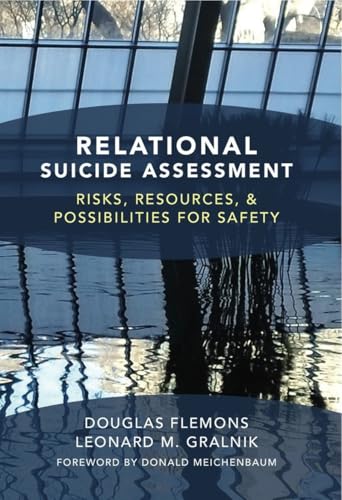Relational Suicide Assessment
Risks, Resources, and Possibilities for Safety
Douglas Flemons PhD LMFT; Leonard M. Gralnik
BOOK REVIEW

In today's world, where mental health is becoming an increasing point of discussion and concern, Relational Suicide Assessment: Risks, Resources, and Possibilities for Safety emerges as a groundbreaking contribution to the field. Co-authored by Douglas Flemons, PhD, LMFT, and Leonard M. Gralnik, this book presents a fresh look at suicide assessment, transcending traditional methods by embedding narrative and relational perspectives into clinical practice. If you're delving into the depths of mental health or are a professional offering guidance in this realm, this text is not just a recommendation-it's a necessity.
Imagine sitting across from someone whose pain is invisible-an intricate web of unexpressed emotions, unresolved conflicts, and untold narratives. The risk of suicide hangs in the air, heavy and suffocating. This book arms you with not just techniques but a profound understanding of context. Flemons and Gralnik provide a blueprint for assessing suicide risk through the lens of relationships. Their approach is simple yet revolutionary: it prioritizes dialogue, emphasizing the importance of understanding the individual's social environment and personal history rather than just focusing on isolated symptoms. This method encourages an empathetic connection that can often bridge the gap between despair and hope.
Throughout its pages, the book unfolds like a poignant tapestry woven with stories, theories, and practical resources. The authors empower readers by presenting various assessment tools, underscoring the significance of recognizing the individual's lived experience. What resonates deeply in this work is the call to be present, to listen fiercely. They argue convincingly that understanding suicide risk is not solely about identifying symptoms; it is about recognizing the humanity in each person who feels lost in their circumstances.
The poignant acknowledgments surrounding this topic resonate across societies. With suicide rates climbing in many parts of the world, the urgency for such discourse cannot be overstated. Readers have shared their emotional reactions, often calling the insights shared by Flemons and Gralnik a "lifeline to both practitioners and individuals in need." Such comments underscore a profound realization-the methods discussed in this book could potentially save lives.
However, like all impactful works, Relational Suicide Assessment has not escaped criticism. Some argue that the depth of relational exploration offered can overshoot practical application in time-constrained environments. Others debate the balance between theoretical underpinnings and actionable strategies. Yet, these discussions only enrich the dialogue surrounding an already critical issue.
The cultural context in which this book has been released is equally vital. Mental health awareness and suicide prevention have jumped to the forefront of societal issues, influenced by the global pandemic, social media pressures, and a growing acknowledgment of mental health disorders. As we venture further into the 21st century, the insights from Relational Suicide Assessment are timely and relevant.
Flemons and Gralnik also touch upon the necessity of resources and support systems, a crucial ingredient often overlooked in traditional assessments. It's a clarion call for a paradigm shift-a reminder that we cannot treat suicide as a mere numbers game. The authors illustrate the imperative for community support, emphasizing that the resources available can shape the safety net around an individual grappling with suicidal thoughts.
In closing, the impact of Relational Suicide Assessment: Risks, Resources, and Possibilities for Safety transcends the pages it's printed on. This book has the power to transform how we perceive and respond to suicidal ideation. Whether you are a mental health professional, a caregiver, or someone seeking to understand the deeper currents of the human experience, let this be a guiding compass in the stormy seas of despair.
Each chapter invites you to reflect, fostering a robust conversation about an often-taboo subject. Prepare to walk away not just with knowledge, but with a renewed sense of responsibility towards others, infused with empathy and understanding. 🌊 Don't miss out on diving into this enlightening resource; the lives you might touch could come from insights steeped in its pages.
📖 Relational Suicide Assessment: Risks, Resources, and Possibilities for Safety
✍ by Douglas Flemons PhD LMFT; Leonard M. Gralnik
🧾 272 pages
2013
#relational #suicide #assessment #risks #resources #possibilities #safety #douglas #flemons #lmft #DouglasFlemonsPhDLMFT #leonard #gralnik #LeonardMGralnik